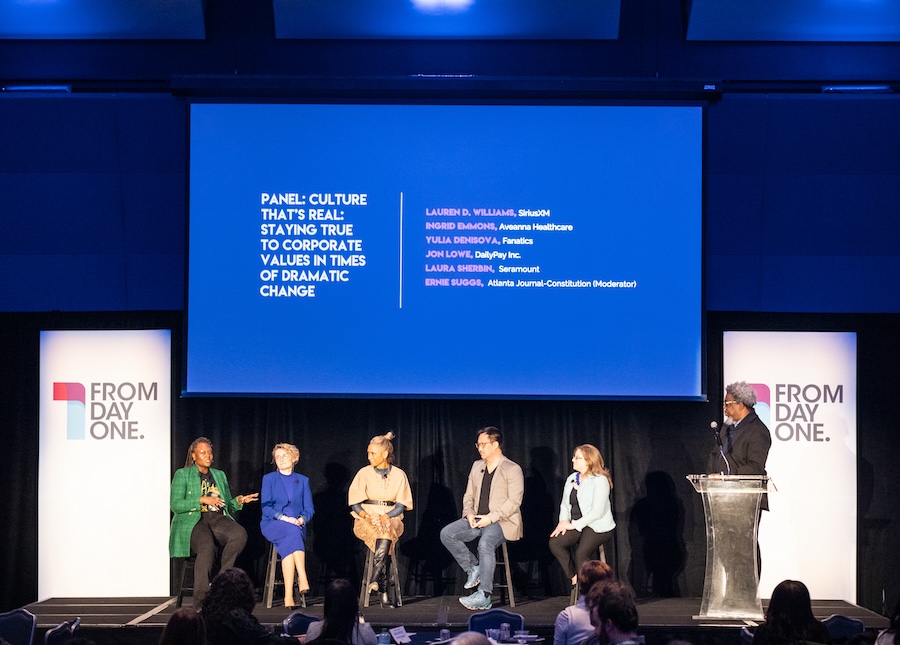Authenticity, Listening, and Trust: Building Authentic Workplace Culture


“Culture, real culture for any organization, is the beliefs, processes, and behaviors that are acceptable by [the] organization,” said Lauren D. Williams, SVP of organizational culture and change management at Sirius XM.
Williams and other executive panelists shared insights on cultivating meaningful workplace environments that foster belonging and trust at From Day One’s Atlanta conference. The panel quickly identified authenticity as the cornerstone of effective company culture. Williams emphasized the importance of staying “true to your DNA as an organization and what you stand for, what you believe in, your values, in order to make sure that culture is actually something that's successful.”
Building on this foundation, Yulia Denisova, VP of talent and development for Fanatics, says clear communication is key. “Being clear in communicating that to our workforce, so that we don’t have unrealized expectations is crucial, particularly when organizations have diverse needs.”
Ingrid Emmons VP, head of diversity, equity and inclusion for Aveanna Healthcare says there’s no singular macro culture. “Culture exists on the micro level, on every team, no matter how big or small. Our ultimate goal is to build micro cultures that create this overarching macro culture,” she said.
Jon Lowe, the chief people officer of DailyPay, a financial benefits company offering earned wage access, spoke on how culture differentiates within a company.”Culture exists agnostic of the leadership team,” he said “I think every organization has culture, and I think that we as leaders try to shape what that culture is, but I don't think we own it. We try to lead it.” His observation highlights the organic nature of culture that develops, regardless or in addition to formal initiatives.
The Importance of Effective Communication
Laura Sherbin, managing director of research and consulting at Seramount, a talent services firm, highlighted the importance of truly understanding how employees experience culture. “When you actually ask employees, they’ll say it’s completely different based on their team, based on their work group, based on their identity.” Knowing what matters also helps boost inclusion, something that’s “not an agenda, it's a business imperative,” said Sherbin.
Listening is key, says Williams, of Sirius XM. “Listen to understand and don’t listen to [just] respond,” she said. “[Employees] want to feel like they belong. They want to feel included. They want to feel seen, valued, heard and understood.”
Understanding the experience of frontline workers is also imperative. Emmons says the best way to do this is truly stepping in their shoes. “Spend time doing the work that they do. Until you have that experience, I don’t know how you can truly understand their lived experience,” she said.

Understanding experience can help boost trust, which is critical. Trust forms the foundation for authentic connection. “The number one ingredient to a successful foundation is building this sense of trust. It’s all about allowing people to bring their best selves,” said Williams. At Sirius XM, she implemented their first volunteer day off, encouraging employees across 20 locations to give back to their communities, which helped foster relationships beyond daily work interactions.
This initiative addresses what Emmons identified as a growing crisis in American workplaces. “What we know is that 12% of US adults say that they don't have a best friend, they don't have anyone to call from the emergency room. That is up from 3% in 2009," she said, citing the Surgeon General’s research about a loneliness epidemic.
Even more troubling for employers, Emmons says that around 65% of U.S. workers tell us they experience no sense of community at work—a challenge that intensified during remote work but persists even in hybrid environments.
Managing Cultural Evolution
As organizations grow or undergo transformation, maintaining cultural alignment becomes challenging. Denisova shared Fanatics’ experience of evolving from a startup to a global enterprise serving “100+ million fans globally, in 180 countries,” while trying to preserve its entrepreneurial spirit.
The company's solution was implementing “bold principles” throughout the employee lifecycle. “These are the principles that really tie us together, whether you’re a forklift operator in the distribution center or a software engineer in the Silicon Valley,” she said.
Successful cultural evolution requires self-awareness, says Sherbin. “When you think of a merger or an acquisition, culture is often what sabotages that. The thing that happens before that, though, is a complete lack of self-awareness of what the cultures are.”
Chris O’Keeffe is a freelance writer with experience across industries. As the founder and creative director of OK Creative: The Language Agency, he has led strategy and storytelling for organizations like MIT, Amazon, and Cirque du Soleil, bringing their stories to life through established and emerging media.
(Photos by Dustin Chambers for From Day One)
The From Day One Newsletter is a monthly roundup of articles, features, and editorials on innovative ways for companies to forge stronger relationships with their employees, customers, and communities.